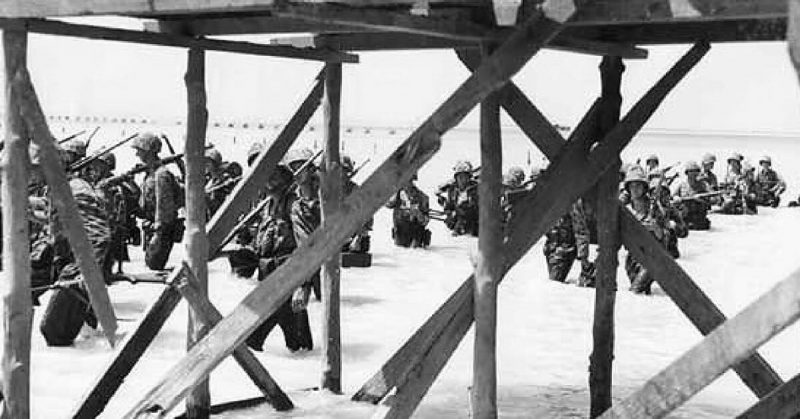Edwin Glasberg, 92, has lived an extraordinary life and is known as a WWII hero for a number of reasons. He was born on the 14th may, 1924, in Boston and as soon as he was able, he left school and enlisted in the Marines. He was assigned to C Company, 1st Battalion, 2nd Marine Regiment, 2nd Division.
War broke out and he was sent to the Western Pacific where he first used his weapon in anger. He was one of the 18,000 Marines that made up the first wave that landed on the Island of Tarawa. There was no significant resistance on the beach, as the Navy had shelled the Japanese positions before the Marines landed, and his company ran up the beach sheltering behind a four foot high wall. From that point on the battle became increasingly bloody as the Japanese detachment of 4,500 men fought back. Japanese snipers had been positioned in the trees and picked off the American forces at will. Glasberg spotted a sniper hidden in a coconut tree and dashed to the foot of the tree. Pressing his body against the trunk, where he was safe as the machine gun could not be pointed straight down, he noticed a wounded lieutenant but Glasberg could not reach him as that would place him in the line of fire. Blazing hot, spent cartridge shells rained down on his head as the Japanese sniper maintained fire at the American forces, so Glasberg simply pointed his rifle straight up and started shooting. He could not see the sniper but as the firing from the top of the tree stopped he could only assume that he had shot the sniper, “I don’t know if I hit him or somebody else did, but he stopped firing. I wasn’t going to climb up to find out.”
The battle raged on and Glasberg, in the company of several Marines, was on manoeuvres when a Japanese soldier leaped out from behind a wood pile and bayoneted Glasberg in the right thigh. “I didn’t realize I got bayoneted,” he said. “You’re so excited, you don’t feel anything.” The Marine in line behind him took out his pistol and shot the enemy soldier in the head. Despite a bleeding wound in his leg, Glasberg remained in the fight.
His next major battle was during the invasion of Saipan. He was part of the contingency that were fighting for Hill 101 and part way up the hill he was wounded for the second time when a bullet grazed the left side of his head. He was awarded his second Purple Heart for this injury and was shipped back to the USA, where he was deployed at the submarine base at Portsmouth on the East Coast.
Soon, he was back in the thick of things when he was part of the boarding party that took control of a German submarine, U-805, that had been forced to surrender. Glasberg was woken in the early hours of 12th May 1945 and ordered to take his rifle, ammunition, and other combat paraphernalia and to report for duty. He had been selected as his file indicated that he spoke German.
Riding in a Navy tender, he and the other six members of the boarding party travelled 25 miles into the Atlantic where they came upon a surreal sight. There lay a German U-Boat on the surface surrounded by six destroyers. The boarding party climbed aboard and in his best schoolboy German, Glasberg yelled, “Alle deutschen Krauts, raus und schnell!” (All you Germans, get out, and fast!) Waving the machine gun in their faces encouraged the German crew to leave quickly, and Glasburg turned to the submarine skipper, Korvettenkapitan Richard Bernardelli. He told the captain, who spoke English, “We’re Marines, not murderers. We’re not going to kill you guys. If the tables were turned, you’d kill us, but we’re not going to do that to you.”
All 31 of the crew were captured, and Glasberg used his fluency in German to look through the papers that were found in the captain’s cabin. “I went to the captain’s quarters. We went through all their maps, and I read them in German, the detailed instructions of their combat patrol. I read the German report. They had sunk three of our ships on their patrol, one off of Nova Scotia, and two in the Saint Lawrence estuary.”
The submarine was then towed to Portsmouth harbour; a trip Glasberg does not remember with any fondness, “I stayed up in the conning tower because the submarine is so musty. You can hardly breathe in it. Plus I got seasick because a submarine on the surface, it’s bobbing up and down in the Atlantic swells.”
After the war, Glasberg lived in Massachusetts where he founded a company making hairbrushes. He married, and his wife bore them three daughters. Glasberg, now 92 years old, is a proud member of the Naples Marine Corps League, and can often be found recounting stories of his life as a marine during WWII at League meetings.
“When you come to think of it,” he said, “not too many Marines in World War II were intermingled in combat with both the Germans and the Japanese,” was his last word.
